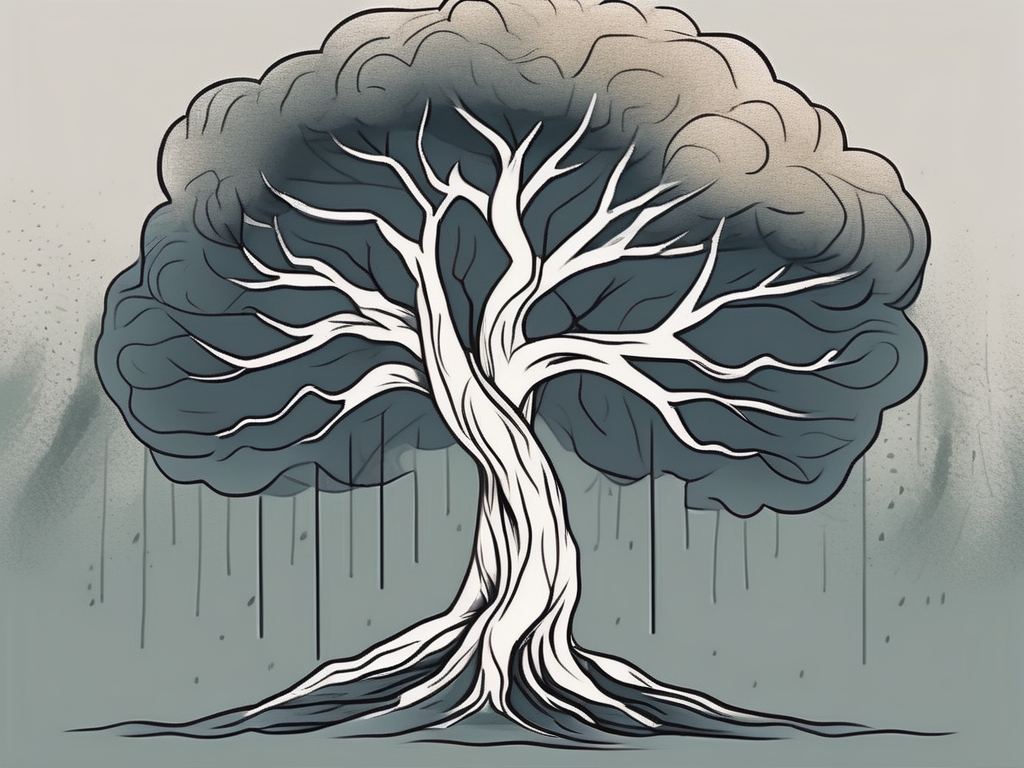In today’s fast-paced world, where stress, emotional turmoil, and uncertainty are constant companions, finding inner peace and resilience can seem like an elusive dream. However, there is a philosophy that has stood the test of time and continues to offer profound benefits to those who embrace it: Stoicism. In this guide, we will dive deep into the world of Stoicism, exploring its origins, key principles, and how it intersects with resilience and inner peace. We will also discover practical ways to incorporate Stoicism into our daily lives, debunk common misconceptions, and explore the powerful role it plays in personal growth and mental health. So, let’s embark on this journey of self-discovery and philosophical wisdom together.
Understanding Stoicism: An Overview
Before we dive into the benefits of Stoicism, it is essential to have a solid understanding of what it entails. Stoicism originated in ancient Greece and was later developed by Roman philosophers such as Seneca, Epictetus, and Marcus Aurelius. At its core, Stoicism is a philosophy of life that teaches individuals to focus on what they can control and accept what is beyond their influence. It is about training the mind to find tranquility amidst chaos and to approach life with calmness and resilience.
Now that we have a brief overview, let’s delve deeper into the origins and philosophy of Stoicism.
The Origins and Philosophy of Stoicism
Stoicism traces its roots back to Zeno of Citium, a Greek philosopher who founded the school of thought in Athens around 300 BCE. The philosophy was strongly influenced by Socrates and the Cynics, but it also incorporated elements from other ancient philosophical traditions.
At its core, Stoicism teaches that the path to true happiness and peace lies in understanding and aligning oneself with nature and the natural order of the universe. According to Stoic philosophy, individuals should focus on developing virtues such as wisdom, courage, temperance, and justice, as these are the qualities that lead to a well-lived and meaningful life.
Stoicism also emphasizes the importance of living in accordance with reason and rationality. By cultivating a rational mindset, individuals can better navigate the complexities of life and make decisions that align with their values and principles.
Furthermore, Stoicism encourages individuals to embrace their social nature and to cultivate strong relationships with others. The philosophy emphasizes the interconnectedness of humanity and the importance of treating others with kindness, empathy, and respect.
Now that we have an understanding of the origins and philosophy of Stoicism, let’s delve into the key principles that form the foundation of this profound philosophy.
Key Principles of Stoicism
Stoicism is built upon a set of principles that guide individuals towards resilience and inner peace. These principles encompass everything from understanding the nature of the world to training the mind to respond to adversity with equanimity. Let’s explore some of the key principles of Stoicism:
- Acceptance of the External: Stoicism teaches individuals to accept that there are many aspects of life beyond their control. By embracing this truth, one can focus on what can be controlled and make peace with the external circumstances.
- Focus on Virtue: According to Stoicism, true happiness lies in living a virtuous life. Virtue, in this context, means cultivating qualities such as wisdom, courage, justice, and self-discipline. By striving to embody these virtues, individuals can lead a life of purpose and fulfillment.
- Recognize Impermanence: Stoics understand that everything in life is impermanent. By acknowledging the transient nature of things, individuals can let go of attachment and find peace in the present moment. This principle encourages individuals to embrace change and to appreciate the beauty of each passing moment.
- Practice Resilience: Stoicism emphasizes the cultivation of resilience in the face of adversity. By embracing challenges and approaching them with a rational mindset, individuals can navigate difficulties with grace and fortitude. This principle encourages individuals to view obstacles as opportunities for growth and to develop a mindset of perseverance.
- Live in Accordance with Nature: Stoicism teaches individuals to live in harmony with nature and the natural order of the universe. This involves aligning one’s desires and actions with reason and accepting the inherent interconnectedness of all things. By living in accordance with nature, individuals can find a sense of purpose and fulfillment.
- Practice Self-Reflection: Stoicism encourages individuals to engage in regular self-reflection and introspection. By examining one’s thoughts, emotions, and actions, individuals can gain a deeper understanding of themselves and make necessary improvements. This principle emphasizes the importance of self-awareness and personal growth.
The Intersection of Stoicism, Resilience, and Inner Peace
Now that we have a solid understanding of Stoicism’s origins and principles, let’s explore how this ancient philosophy intersects with resilience and inner peace.
Stoicism, with its emphasis on self-discipline and mental fortitude, naturally aligns with the concept of resilience. Resilience is the ability to bounce back from setbacks, face challenges head-on, and adapt in the face of adversity. Stoicism provides a powerful framework for cultivating resilience by teaching individuals to see obstacles as opportunities for growth, to embrace discomfort, and to develop a mindset focused on finding solutions rather than dwelling on problems.
When faced with difficult situations, Stoics are encouraged to view them as tests of character and opportunities for personal development. By practicing Stoic principles, individuals can build mental resilience, enabling them to navigate life’s ups and downs with unwavering strength and an unwavering spirit.
Moreover, Stoicism teaches individuals to develop a sense of detachment from external circumstances, which is essential for maintaining inner peace. While resilience is a crucial aspect of Stoicism, its ultimate goal is to help individuals find inner peace. Stoicism teaches individuals to detach their emotions from external circumstances and to cultivate a deep sense of tranquility that is not swayed by the turbulence of life.
Stoics understand that they cannot control everything that happens to them, but they can control how they respond to it. By focusing on what is within their control and accepting what is not, Stoics can find a serene state of mind that allows them to experience inner peace regardless of the chaos and uncertainty that surrounds them.
Inner peace, in the Stoic sense, is not about avoiding or suppressing emotions but rather about developing the ability to respond to them with wisdom and equanimity. Stoics believe that by practicing self-discipline and cultivating virtuous qualities such as courage, temperance, and justice, individuals can achieve a state of inner tranquility that is not dependent on external circumstances.
In conclusion, Stoicism and resilience share a natural alliance, as Stoic principles provide a powerful framework for building mental resilience. Additionally, Stoicism’s ultimate goal is to help individuals find inner peace by cultivating a sense of detachment from external circumstances. By practicing Stoicism, individuals can develop the resilience and inner peace necessary to navigate life’s challenges with grace and tranquility.
The Profound Benefits of Stoicism
Now that we understand the philosophy and goals of Stoicism, let’s explore some of the profound benefits it offers to those who embrace it.
Stoicism, with its ancient roots and timeless wisdom, has been found to provide a multitude of advantages that positively impact various aspects of life. From mental health to stress management and personal growth, Stoicism offers a comprehensive framework for living a fulfilling and meaningful existence.
Mental Health Advantages of Stoicism
Stoicism provides a powerful framework for enhancing mental well-being. By teaching individuals to question negative thoughts, detach from destructive emotions, and develop rationality and objectivity, Stoicism can help alleviate the symptoms of anxiety, depression, and other mental health challenges.
Through the practice of Stoicism, individuals gain the ability to cultivate a resilient mindset, allowing them to navigate the complexities of life with greater ease. By adopting Stoic principles, individuals can develop a more positive outlook, leading to improved mental clarity and emotional stability.
Moreover, Stoicism encourages individuals to focus on what they can control, rather than wasting energy on things beyond their influence. This shift in perspective can significantly reduce feelings of helplessness and empower individuals to take charge of their mental well-being.
The Role of Stoicism in Stress Management
Stress has become an inevitable part of modern life, affecting our mental and physical well-being. Stoicism offers effective strategies for managing stress by teaching individuals to focus on what they can control and let go of what they cannot. By adopting a Stoic mindset, individuals can reduce unnecessary stress and find a sense of calm and resilience even in the most challenging situations.
Stoicism provides individuals with a set of tools to navigate the ups and downs of life with equanimity. By embracing the Stoic principles of acceptance and detachment, individuals can develop a greater capacity to handle stress and adversity. This newfound resilience allows them to face challenges head-on, without being overwhelmed by negative emotions.
Furthermore, Stoicism emphasizes the importance of living in the present moment and accepting the impermanence of external circumstances. By focusing on the here and now, individuals can cultivate a sense of gratitude and contentment, reducing stress levels and promoting overall well-being.
Stoicism and Personal Growth
Stoicism is not only about finding inner peace and resilience; it also provides a powerful framework for personal growth and self-improvement. By focusing on virtues such as wisdom, courage, and justice, Stoic practitioners strive to become the best version of themselves.
Stoicism encourages continuous self-reflection, learning, and growth, empowering individuals to develop strong character and lead a life aligned with their values. By practicing Stoic principles, individuals can cultivate virtues that contribute to their personal and professional development.
Furthermore, Stoicism emphasizes the importance of living a life of purpose and meaning. By aligning one’s actions with their values and principles, individuals can experience a profound sense of fulfillment and satisfaction.
In conclusion, Stoicism offers a wealth of benefits that extend beyond philosophical musings. By incorporating Stoic practices into daily life, individuals can experience improved mental health, effective stress management, and personal growth. Stoicism provides a roadmap for living a life of purpose, resilience, and virtue.
Practical Ways to Incorporate Stoicism into Daily Life
Now that we have explored the profound benefits of Stoicism, you may be wondering how to incorporate this philosophy into your daily life. Here are a few practical ways to embrace Stoicism:
Mindfulness and Stoicism: A Powerful Combination
Mindfulness and Stoicism share a common goal: to bring individuals into the present moment and cultivate a sense of inner peace. By practicing mindfulness, individuals can enhance their ability to observe their thoughts and emotions without judgment, a fundamental aspect of Stoicism.
Combining mindfulness practices, such as meditation and breath awareness, with Stoic principles can create a harmonious synergy that enhances self-awareness, tranquility, and resilience.
Stoic Exercises for Everyday Life
Beyond philosophical principles, Stoicism offers practical exercises that can be incorporated into daily life to strengthen resilience and embrace inner peace. Some of these exercises include:
- Journaling: Write down daily reflections, gratitudes, and challenges to foster self-awareness and reinforce Stoic principles.
- Negative Visualization: Reflect on worst-case scenarios to develop gratitude and appreciation for the present moment.
- Memento Mori: Contemplate the inevitability of death to cultivate a sense of urgency and focus on what truly matters.
Overcoming Common Misconceptions About Stoicism
As with any philosophy, Stoicism is not immune to misconceptions. Let’s address and debunk some of the common misconceptions surrounding Stoicism:
Stoicism: Not Just a Philosophy for Men
Stoicism is often associated with masculinity due to its emphasis on resilience and emotional detachment. However, Stoicism is a philosophy for all genders and has empowered countless individuals, regardless of their gender identity, to find inner peace and lead meaningful lives.
Embracing Stoicism does not mean suppressing emotions but rather understanding and managing them in a way that promotes well-being.
Stoicism and Emotion: A Balanced View
One of the misconceptions about Stoicism is that it encourages the suppression of emotions. However, Stoicism teaches individuals to cultivate emotional resilience and rationality rather than repressing or denying emotions.
Stoics acknowledge and experience emotions but strive to approach them with a balanced view, understanding that emotions are natural responses and not necessarily reflective of reality.
Embrace the Profound Benefits of Stoicism
As we conclude this guide to embracing resilience and inner peace through Stoicism, we hope you have gained a newfound appreciation for this ancient philosophy and its transformative potential. Stoicism offers practical wisdom for navigating life’s challenges, enhancing mental well-being, and finding a sense of tranquility amidst chaos.
By incorporating Stoic principles into your daily life, practicing mindfulness, and embracing personal growth, you can unlock the profound benefits of Stoicism and embark on a journey of resilience, inner peace, and profound self-discovery.
Remember, the path to Stoicism is a continuous journey, and each step taken brings you closer to the profound benefits that await.












